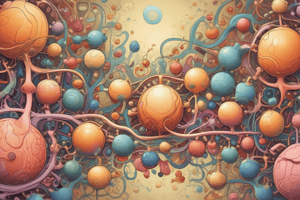Podcast
Questions and Answers
What are triglycerides primarily composed of?
What are triglycerides primarily composed of?
- Glycerol and three fatty acids (correct)
- Glycerol and a phosphate group
- Glycerol and four fatty acids
- Glycerol and two fatty acids
Which hormone promotes lipogenesis?
Which hormone promotes lipogenesis?
- Cortisol
- Glucagon
- Insulin (correct)
- Adrenaline
Which process is responsible for converting fatty acids into acetyl-CoA?
Which process is responsible for converting fatty acids into acetyl-CoA?
- Glycerolysis
- Beta-oxidation (correct)
- Lipogenesis
- Lipid synthesis
What occurs during lipolysis?
What occurs during lipolysis?
Which type of lipid is a major component of cell membranes?
Which type of lipid is a major component of cell membranes?
What regulates lipogenesis mostly in the body?
What regulates lipogenesis mostly in the body?
What occurs primarily in the mitochondria?
What occurs primarily in the mitochondria?
How do essential fatty acids like omega-3 and omega-6 affect the body?
How do essential fatty acids like omega-3 and omega-6 affect the body?
Which disorder is characterized by excessive storage of triglycerides?
Which disorder is characterized by excessive storage of triglycerides?
What is the main role of glucagon in lipid metabolism?
What is the main role of glucagon in lipid metabolism?
Flashcards are hidden until you start studying
Study Notes
Lipid Metabolism
Overview
- Lipid metabolism involves the synthesis and degradation of lipids in cells.
- Crucial for energy production, storage, and cellular structure.
Types of Lipids
-
Triglycerides
- Main form of stored energy.
- Composed of glycerol and three fatty acids.
-
Phospholipids
- Major component of cell membranes.
- Consist of glycerol, two fatty acids, and a phosphate group.
-
Sterols
- Includes cholesterol and steroid hormones.
- Important for membrane structure and signaling.
Lipid Degradation (Lipolysis)
- Breakdown of triglycerides into glycerol and free fatty acids.
- Occurs primarily in adipose tissue.
- Catalyzed by lipases.
- Free fatty acids can be used for energy or converted to ketone bodies.
Fatty Acid Oxidation (Beta-Oxidation)
- Process of breaking down fatty acids in the mitochondria.
- Converts fatty acids into acetyl-CoA.
- Acetyl-CoA enters the citric acid cycle for ATP production.
- Each cycle of beta-oxidation shortens the fatty acid chain by two carbon atoms.
Lipid Synthesis (Lipogenesis)
- Process of synthesizing fatty acids from acetyl-CoA.
- Occurs mainly in the liver and adipose tissue.
- Involves several key enzymes, including:
- Acetyl-CoA carboxylase (ACC)
- Fatty acid synthase (FAS)
- Regulated by insulin and nutritional status.
Key Hormones in Lipid Metabolism
- Insulin
- Promotes lipogenesis and inhibits lipolysis.
- Glucagon
- Stimulates lipolysis and fatty acid oxidation.
- Adrenaline
- Increases lipolysis during stress or exercise.
Disorders Related to Lipid Metabolism
- Obesity
- Excessive storage of triglycerides.
- Diabetes
- Impaired insulin signaling affects lipid metabolism.
- Cardiovascular Disease
- Dyslipidemia (abnormal lipid levels) contributes to plaque formation in arteries.
Nutritional Aspects
- Essential fatty acids (omega-3 and omega-6) must be obtained from diet.
- Balance between saturated and unsaturated fats is important for health.
- Trans fats should be minimized due to their harmful effects on lipid profiles.
Overview of Lipid Metabolism
- Involves the synthesis and breakdown of lipids, essential for energy production, storage, and cell structure.
Types of Lipids
- Triglycerides: Primary energy storage form, made of glycerol and three fatty acids.
- Phospholipids: Key components of cell membranes, comprised of glycerol, two fatty acids, and a phosphate group.
- Sterols: Include cholesterol and steroid hormones, critical for membrane integrity and cellular signaling mechanisms.
Lipid Degradation (Lipolysis)
- Breakdown of triglycerides occurs mainly in adipose tissue and is facilitated by lipases.
- Produces glycerol and free fatty acids, which can be utilized for energy or converted into ketone bodies.
Fatty Acid Oxidation (Beta-Oxidation)
- Takes place in the mitochondria, converting fatty acids into acetyl-CoA.
- Acetyl-CoA enters the citric acid cycle to generate ATP.
- Each beta-oxidation cycle reduces the fatty acid chain by two carbon atoms.
Lipid Synthesis (Lipogenesis)
- Synthesis of fatty acids from acetyl-CoA primarily happens in the liver and adipose tissue.
- Key enzymes include Acetyl-CoA carboxylase (ACC) and Fatty acid synthase (FAS).
- Process is regulated by insulin and overall nutritional status.
Key Hormones in Lipid Metabolism
- Insulin: Encourages lipogenesis and inhibits lipolysis.
- Glucagon: Promotes lipolysis and fatty acid oxidation.
- Adrenaline: Amplifies lipolysis during periods of stress or physical activity.
Disorders Related to Lipid Metabolism
- Obesity: Characterized by excessive triglyceride storage.
- Diabetes: Insulin signaling impairment disrupts normal lipid metabolism.
- Cardiovascular Disease: Dyslipidemia contributes to arterial plaque formation and related complications.
Nutritional Aspects
- Essential fatty acids like omega-3 and omega-6 must be ingested through diet.
- Maintaining a balance of saturated versus unsaturated fats is critical for health.
- Minimizing trans fats is essential due to their negative impact on lipid profiles.
Studying That Suits You
Use AI to generate personalized quizzes and flashcards to suit your learning preferences.




